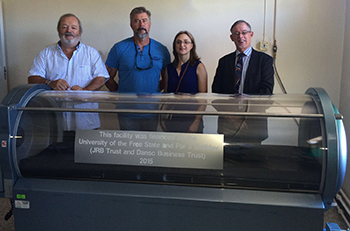Latest News Archive
Please select Category, Year, and then Month to display items
12 October 2020
|
Story Arina Engelbrecht
|
Photo Supplied
 Arina Engelbrecht from Organisational Development and Employee Well-being believes physical activity has a number of benefits for one’s health, including stress relief.
Arina Engelbrecht from Organisational Development and Employee Well-being believes physical activity has a number of benefits for one’s health, including stress relief.
Being physically active plays a big role in preventing the development of mental-health problems and in improving the quality of life of people experiencing mental-health problems.
Treatment for depression
Physical activity can be an alternative treatment for depression. It can be used as a stand-alone treatment or in combination with medication and/or psychological therapy. It promotes all kinds of changes in the brain, including neural growth, reduced inflammation, and new activity patterns are formed that promote feelings of calm and well-being. It releases endorphins – powerful chemicals in the brain that energise your spirit and make you feel good.
Physical activity can be very effective in relieving stress. Research in adults has found that physically active individuals tend to have lower stress levels compared to individuals who are less active. It also leads to improved sleep. When a person sleeps better and feels more rested, overall quality of life improves. They cope better with daily life stressors.
Reduce Alzheimer's risk
Regular physical activity can reduce your risk of developing Alzheimer's disease by up to 50%. It can also slow down further deterioration in those who have already started to develop cognitive problems. It stimulates the brain’s ability to maintain old connections as well as to make new ones.
A study asked people to rate their mood immediately after periods of physical activity (e.g. going for a walk/run, cycling, doing housework) and periods of inactivity (e.g. reading a book or watching television). Researchers found that participants felt more content, more awake, and calmer after being physically active compared to after periods of inactivity.
In conclusion, people who are physically active feel a sense of well-being, feel more energetic throughout the day, sleep better at night, have sharper memories, and feel more relaxed and positive about themselves and their lives.
“Being physically active not only changes your body, it changes your mind,
attitude, and your mood.” – Arina Engelbrecht
Department of Oncology provides hyperbaric chamber to cancer patients – a first in the Free State
2016-03-21

From the left: De Villiers Brink, Gys Botes (both of the Par3 Golfday group that donated towards the hyperbaric chamber), Dr Alicia Sheriff (Head of the UFS Department of Oncology) and Prof Gert van Zyl (Dean of the UFS Faculty of Health Sciences). |
Thanks to the Department of Oncology at the University of the Free State (UFS), cancer patients now have access to a hyperbaric chamber – a medical treatment that enhances the body’s healing process through the inhalation of oxygen.
In order to realise this tremendous addition to the treatment of cancer patients, the Department of Oncology established collaboration between the UFS School of Medicine, the Free State Department of Health, and a group of private donors. Currently the only one in the Free State, the hyperbaric chamber has been installed at the Oncology ward at National Hospital in Bloemfontein and will benefit not only patients from the Free State, but also the North West province and the Northern Cape.
While lying down in the chamber, the patient’s body absorbs more oxygen as a result of the high levels of air pressure. This process stimulates the healing of cancer wounds and various other injuries, including sports injuries.
Dr Alicia Sherriff, Head of the Department of Oncology (UFS), says her team is passionate about enhancing the quality of their patients’ lives, even when facing difficult circumstances. “I believe that the hyperbaric chamber is just one way of achieving this, since it helps decrease the harm done by certain medical conditions on the human body,” Dr Sherriff says.